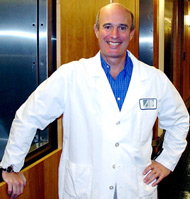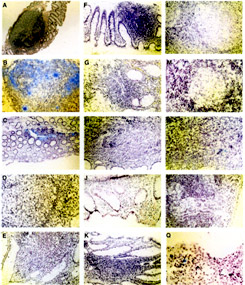Unraveling HIV Pathogenesis and Advancing New Treatments for AIDS

Markowitz, Martin
Since 1995 clinical studies of AIDS patients at the Rockefeller Hospital have helped save lives. This research, carried out through Rockefeller’s close association with the Aaron Diamond AIDS Research Center (ADARC) and its director David Ho (1952 - ), has given scientists a better understanding of what happens in the body of a person who becomes infected with HIV-1, the virus that causes AIDS. Rockefeller and ADARC scientists also have pioneered many new therapies, from the multi-drug “AIDS cocktail” in the mid-1990s—a turning point in AIDS therapy—to recent clinical trials of a new class of drugs known as integrase inhibitors. As an Aaron Diamond Professor at Rockefeller University and clinical director at ADARC, Martin Markowitz (1953 - ) directs these clinical and translational studies.
From the outset, one goal of the Rockefeller-ADARC collaboration has been to recruit newly infected individuals to participate in studies to understand HIV pathogenesis. Working with hundreds of these patients, Markowitz and colleagues have led the way in evaluating treatment regimens to find the best approach to therapy for acute infection. Over more than a decade, researchers also have been able to use data from this group to track the evolution of drug resistance in the HIV-1 virus. And in investigations of acute and early infection, Markowitz and coworkers have established that crucial immune system cells (CD4+ cells) in the gastrointestinal tract are particularly susceptible to HIV-1 infection.

Early treatment of HIV-1 infection: lymphoid tissue histology. From J Infect Dis, 1999, 179: 527-537
Another priority of Markowitz’s research is to develop and study new drugs, all the way from initial investigations of how a compound moves through the body (its pharmacokinetics), to clinical trials of novel compounds that lead to approval by regulatory agencies. In the 1990s Markowitz and colleagues advanced the development of the first class of drugs used to treat AIDS—protease inhibitors, which interfere with the virus’s ability to replicate and have long been the gold standard for treating HIV-1 infection. Studies carried out at the Rockefeller Hospital also contributed to the understanding of the potential of nucleoside reverse transcriptase inhibitors, another class of AIDS drugs, as part of a combination therapy regimen. Over time, HIV-1 has become increasingly resistant to treatment with these drugs, and Markowitz and colleagues recently pioneered studies of a new class of drugs called integrase inhibitors, which prevent the virus from integrating its genes with the host’s chromosome. Of these, the Merck drug raltegravir received FDA approval in 2007, and the Gilead compound GS9137 has reached phase III clinical trials.
Martin Markowitz received the BA from the State University of New York at Buffalo (1974) and the MD from the Stanford University School of Medicine (1978). After an internship and residency at Mount Zion Hospital and Medical Center at the University of California, San Francisco, he became a clinical fellow and then a research fellow at Cornell Medical College (1981-1983). Among several clinical appointments, Markowitz was attending hematologist/oncologist at St. Clare’s Hospital (1985-1989), which housed the first dedicated AIDS Unit in New York City, at a time when little could be done to treat the disease. This experience inspired him to turn to research. In 1991 Markowitz moved to NYU Bellevue as a clinical fellow, and in 1992 he joined the Aaron Diamond AIDS Research Center as a postdoctoral fellow. In 1995 he was appointed to the faculty at ADARC and rose to professor with tenure at ADARC in 2006. Markowitz also is an associate physician at the Rockefeller University Hospital.
Selected Publications
Ho DD, Neumann AU, Perelson AS, Chen W, Leonard JM, and Markowitz M. Rapid turnover of plasma virions and CD4 lymphocytes in HIV-1 infection. Nature, 1995, 373: 123–126
Markowitz M, Saag M, Powderly W, Hurley AM, Hsu A, Valdes JM, Henry D, Sattler F, La Marca A, Leonard JM, and Ho DD. A preliminary study of ritonavir, an inhibitor of HIV-1 protease, to treat HIV-1 infection. N Engl J Med, 1995, 333: 1534-1539
Markowitz M, Conant M, Hurley A, Schluger R, Duran M, Peterkin J, Chapman S, Patick A, Hendricks A, Yuen GJ, Hoskins W, Clendennin N, and Ho DD. A preliminary evaluation of nelfinavir meyslate, an inhibitor of human immunodeficiency virus (HIV)-1 protease, to treat HIV infection. J Infect Dis, 1998, 177: 1533-1540
http://www.journals.uchicago.edu/toc/jid/1998/177/6
Markowitz M, Vesanen M, Tenner-Racz K, Cao Y, Binley JM, Talal A, Hurley A, Jin X, Chaudhry MR, Yaman M, Frankel S, Heath-Chiozzi M, Leonard JM, Moore JP, Racz P, Nixon DF, and Ho DD. The effect of commencing combination antiretroviral therapy soon after human immunodeficiency virus type-1 infection on viral replication and antiviral immune responses. J Infect Dis, 1999, 179: 527-537
http://www.journals.uchicago.edu/toc/jid/1999/179/3
Markowitz M, Jin X, Hurley A, Simon V, Ramratnam B, Louie M, Deschenes GR, Ramanathan M, Barsoum S, Vanderhoeven J, He T, Chung C, Murray J, Perelson AS, Zhang L, and Ho DD. Discontinuation of antiretroviral therapy commenced early in the course of HIV-1 infection with or without adjunctive vaccination. J Inf Dis, 2002, 186: 634-643
http://www.journals.uchicago.edu/toc/jid/2002/186/5
Ramratnam B, Ribeiro R, He T, Chung C, Simon V, Vanderhoeven J, Hurley A, Zhang L, Perelson AS, Ho DD, and Markowitz M. Intensification of antiretroviral therapy accelerates the decay of the latent reservoir of HIV-1 and decreases but does not eliminate ongoing virus replication. JAIDS, 2004, 35: 33-37
http://journals.lww.com/jaids/Fulltext/2004/01010/Intensification_of_Antiretroviral_Therapy.4.aspx
Mehandru S, Poles MA, Tenner-Racz K, Horowitz A, Hurley A, Hogan C, Boden D, Racz P, and Markowitz M. Primary HIV-1 infection is associated with preferential depletion of CD4+ T lymphocytes from effector sites in the gastrointestinal tract. J Exp Med, 2004, 200: 761-770
http://jem.rupress.org/cgi/reprint/200/6/761
Mehandru S, Poles MA, Tenner-Racz K, Jean-Pierre P, Manuelli V, Lopez P, Shet A, Low A, Mohri H, Boden D, Racz P, and Markowitz M. Lack of mucosal immune reconstitution during prolonged treatment of acute and early HIV-1 infection. PLoS Med, 2006, 3: e484
http://www.plosmedicine.org/article/info%3Adoi%2F10.1371%2Fjournal.pmed.0030484
Shet A, Berry L, Mohri H, Mehandru S, Chung C, Kim A, Jean-Pierre P, Hogan C, Simon V, Boden B, and Markowitz M. Tracking the prevalence of transmitted antiretroviral drug-resistant HIV-1: A decade of experience. JAIDS, 2006, 41: 439-446
http://journals.lww.com/jaids/Fulltext/2006/04010/Tracking_the_Prevalence_of_Transmitted.6.aspx
Markowitz M, Nguyen BY, Gotuzzo E, Mendo F, Ratanasuwan W, Kovacs C, Prada G, Morales-Ramirez JO, Crumpacker CS, Isaacs RD, Gilde LR, Wan H, Miller MD, Wenning LA, and Teppler H. Protocol 004 Part II Study Team. 2007. Rapid and durable antiretroviral effect of the HIV-1 integrase inhibitor raltegravir as part of combination therapy in treatment-naive patients with HIV-1 infection: Results of a 48-week controlled study. JAIDS, 2007, 46: 125-133
http://journals.lww.com/jaids/Fulltext/2007/10010/Rapid_and_Durable_Antiretroviral_Effect_of_the.1.aspx
Further Reading
Evering TH, and Markowitz M. 2008. Raltegravir: an integrase inhibitor for HIV-1. Expert Opin Investig Drugs, 2008, 17: 413-422. (PMID: 18321239).
Ho DD, Bieniasz PD. HIV-1 at 25. Cell, 2008, 133: 561-565
http://download.cell.com/pdf/PIIS0092867408005655.pdf
Links
Aaron Diamond AIDS Research Center
http://www.adarc.org/index.html
Martin Markowitz Laboratory, ADARC
http://www.adarc.org/markowitz_426.html
Rockefeller Hospital
http://www.rucares.org/
Rockefeller Hospital Clinical Studies and Protocols for HIV and AIDS
http://www.rucares.org/clinicalstudies/list.php?cat=20&listby=
